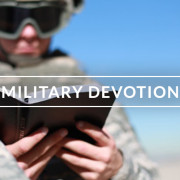Wages of sin – February 28, 2021
Aaron’s sons Nadab and Abihu took their censers, put fire in them, and added incense; and they offered unauthorized fire before the LORD, contrary to his command. So fire came out from the presence of the LORD and consumed them, and they died before the LORD.
Leviticus 10:1,2
Devotion based on Leviticus 10:1,2
See series: Military Devotions
The day would never be forgotten by any of them. It began with high excitement and ended with shocking sorrow.
It could have been the best day of Aaron’s life. Instead, it was the day that he saw two of his sons killed.
Killed by God.
We know that the Bible says the wages of sin is death. But death does not usually come so quickly after sin—and not so dramatically.
Aaron had been chosen to be the high priest by the Lord himself. Four of his sons were selected to share the honor of officiating at the worship services of Israel.
On this first day of ministry, Aaron had just slaughtered an ox and ram. He sprinkled their blood against the sides of the altar. He placed pieces of the animals onto the altar. The fat was then burned off. He offered the sacrifice for sins exactly as the Lord God had commanded.
Then, the Almighty himself appeared there in the form of the glory of the Lord. They had seen this pillar of fire leading them across the wilderness. It had been a reassuring sight.
Now, fire shot out from it and burned up the offering still on the altar. We hear, “And when all the people saw it, they shouted for joy and fell facedown” (Leviticus 9:24).
They had reason to rejoice. The fire, which might have appeared as lightning, showed that the holy Lord God was with them. He had accepted their sin offering. They could sing, “The Lord of hosts is with us. The God of Jacob is our refuge.” They need fear nothing in life or death.
They needed to fear nothing else—except God, himself.
This lesson was taught in a most fearful way.
On that grand and glorious day, fire from the Lord killed Nadab and Abihu.
Their bodies were dragged out while still in their priestly clothes and buried outside of the camp.
Moses then explained to his brother, “This is what the LORD spoke of when he said: ‘Among those who approach me I will show myself holy; in the sight of all the people I will be honored.'”
And the shocked father? “Aaron remained silent” (Leviticus 10:3).
It wasn’t just the shock of seeing his sons killed that silenced him. He was under orders. The rest of the nation could mourn the death of his boys. But not Aaron, nor his two remaining sons.
“Do not let your hair become unkempt, and do not tear your clothes, or you will die and the LORD will be angry with the whole community” (Leviticus 10:6).
No form of grieving was allowed him. No hint of disagreement with God’s actions was to be shown.
The Lord God is a just God. On this day, justice was served.
But what was the crime? “They offered unauthorized fire before the LORD.” We don’t even know what that was—except it was “contrary to his command.”
They sinned.
It’s enough to frighten us—and frightened we should be. But frightened away from sin, not from God!
It reminds us of another time when a Father kept silent as his Son was being killed. It also was a time when justice was served. On that dark Friday, the greatest sacrifice of all was made—for us.
We were sentenced to live, not die. We can live because he died.
The way we live is to demonstrate that we fear, love, and trust in him above all things.
It’s true: “The wages of sin is death.” But this is also true: “The gift of God is eternal life in Christ Jesus our Lord” (Romans 6:23).
The hymn reminds us:
If you think of sin but lightly Nor suppose the evil great,
Here you see its nature rightly, Here its guilt may estimate,
Mark the sacrifice appointed, See who bears the awful load—
‘Tis the Word, the Lord’s Anointed, Son of Man and Son of God.
(Christian Worship 127:3)
We do remember.
Written and recorded by Rev. Paul Horn, WELS National Civilian Chaplain to the Military, San Diego, California.
All Scripture quotations, unless otherwise indicated, are taken from the Holy Bible, New International Version®, NIV®. Copyright ©1973, 1978, 1984, 2011 by Biblica, Inc.™ Used by permission of Zondervan. All rights reserved worldwide. Note: Scripture reading footnotes are clickable only in the web version.


